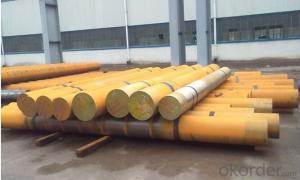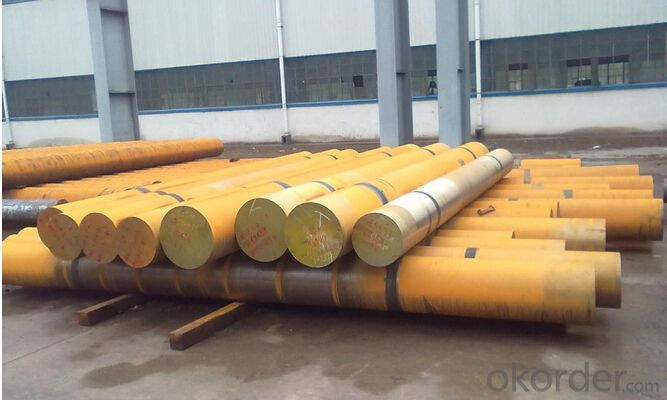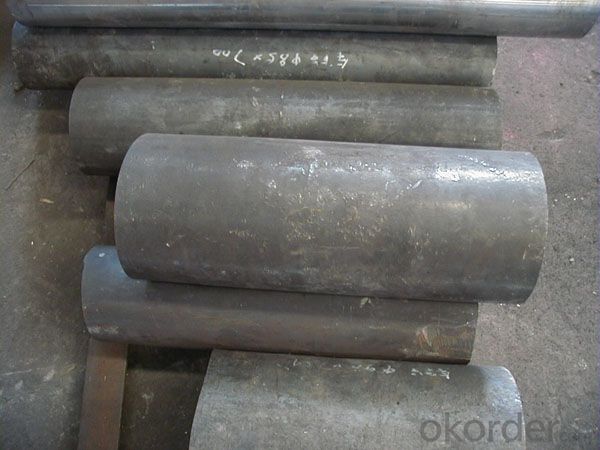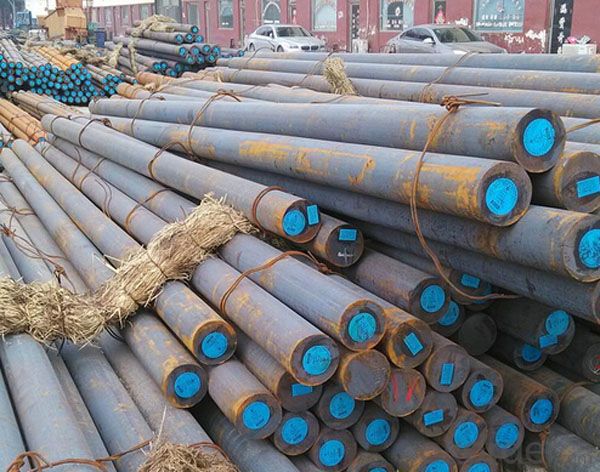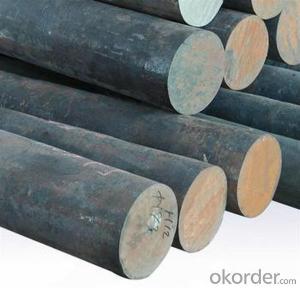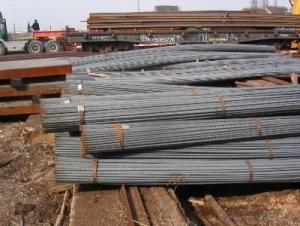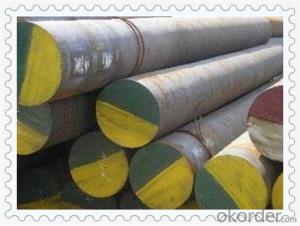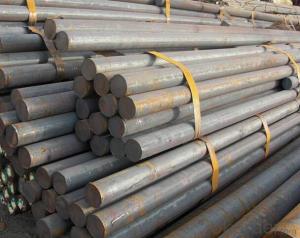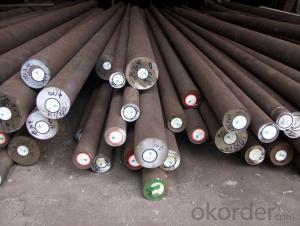Special Steel 4Cr13 Round Bar Steel Bar
- Loading Port:
- China main port
- Payment Terms:
- TT OR LC
- Min Order Qty:
- 30 m.t.
- Supply Capability:
- 10000 m.t./month
OKorder Service Pledge
OKorder Financial Service
You Might Also Like
Specification
Special Steel 4Cr13 Round Bar Steel Bar
Product Information:
Features :
1)high carbon and high chromium
2)high strength and polish performance
3)good abrasion resistance
4)good corrosion resistance
Applications :
For making all sorts of high load and high abrasion resisting plastic moulds and transparent moulds of plastic product on the action of corrosive medium.
Product Overviews:
| Product Name | Typical Grades | Diameter(mm) | Standard adopted |
| Carbon Steel | 20 (1020/S20C/C22) | Ø16-Ø300 | GB/SAE/JIS/DIN |
| 40 (1040/S40C/C40) | |||
| 45 (1045/S45C/C45) | |||
| Bearing Steel | GCr9 (51100/SUJ1) | Ø12-Ø250 | |
| GCr15 (52100/SUJ2/100Gr6) | |||
| GCr9SiMn (A485-Gr.1/SUJ3) | |||
| Cr-Mo Steel | 20Cr (5120/SCr420H/20Cr4) | Ø12-Ø250 | |
| 40Cr (5140/SCr440/41Cr4) | |||
| 42CrMo(4140/SCM440/42CrMo4) | |||
| Gear Steel | 20CrNiMo | Ø16-Ø600 | |
| 20CrMn(5115/SMnC420/20MnCr5) | |||
| 20CrNiMo(8620/SNCM220/20CrMiMo2) |
Product Show:

Our Advantages:
· Industry experience over 20 years.
· Shipment of goods -More than 70 countries worldwide.
· The most convenient transport and prompt delivery.
· Competitive price with best service.
· High technical production line with top quality products.
· High reputation based on best quality products.
With our experienced, enthusiastic and dynamic staffs, we assure to bring you the products with best quality, reasonable prices and good after-sales services under the motto: Friends First, Business After.
Communication, Experience, Expertise and Best efforts are our Promises to you.
- Q: What are the different heat treatment processes used for special steel?
- There are several heat treatment processes used for special steel, including annealing, normalizing, quenching, tempering, and case hardening. Annealing involves heating the steel to a specific temperature and then slowly cooling it to soften it and improve its machinability. Normalizing is similar to annealing but involves cooling the steel in air instead of slowly. Quenching involves rapidly cooling the steel to increase its hardness, while tempering involves reheating the quenched steel to a lower temperature to reduce brittleness and improve toughness. Case hardening is a process where the outer layer of the steel is hardened while maintaining a softer core, enhancing wear resistance.
- Q: What are the specific requirements for special steel used in the railway wheel industry?
- The specific requirements for special steel used in the railway wheel industry include high strength, durability, and resistance to wear and fatigue. The steel must have excellent mechanical properties to withstand heavy loads and impact forces. It should also have good heat treatment characteristics to ensure proper hardness and toughness. Additionally, the steel must meet strict dimensional and geometrical specifications to ensure compatibility with the railway system.
- Q: What are the different pharmaceutical grades of special steel?
- The pharmaceutical industry requires special steel grades that are designed and produced to meet strict requirements. These grades are used in equipment, instruments, and components that directly interact with pharmaceutical products. The different grades of special steel used in the pharmaceutical industry are as follows: 1. 316L Stainless Steel: This grade is widely used in pharmaceutical applications due to its exceptional corrosion resistance and high purity. It is commonly known as surgical stainless steel and is suitable for parts that need frequent cleaning and sterilization. 2. 304 Stainless Steel: This grade is also commonly used in the pharmaceutical industry because of its corrosion resistance and ease of fabrication. It is suitable for equipment and components that do not require frequent cleaning or sterilization. 3. Duplex Stainless Steel: This grade offers a combination of high strength and corrosion resistance, making it suitable for applications where durability and reliability are crucial. It is often used in pharmaceutical processing equipment that handles aggressive chemicals or high-pressure environments. 4. Hastelloy: Hastelloy is a nickel-based alloy that exhibits superior resistance to corrosion, heat, and chemicals. It is commonly used in pharmaceutical applications where extreme conditions are present, such as in reactors or vessels that handle highly corrosive substances. 5. Titanium: Although not technically steel, titanium is considered a pharmaceutical-grade material due to its excellent biocompatibility and corrosion resistance. It is used in medical implants and devices, as well as in pharmaceutical equipment that comes into contact with sensitive drugs. These special steel grades are carefully chosen based on their specific properties and suitability for pharmaceutical applications. They undergo manufacturing and testing processes to ensure compliance with industry standards and regulations, like Good Manufacturing Practices (GMP) and the United States Pharmacopeia (USP). Utilizing the appropriate steel grade in pharmaceutical manufacturing contributes to product safety, quality, and integrity.
- Q: What are the main applications of special steel in the food processing machinery?
- Special steel is widely used in food processing machinery due to its exceptional properties such as corrosion resistance, high strength, and hygiene. Some of the main applications of special steel in this industry include manufacturing blades for cutting and slicing, forming dies for shaping food products, conveyor belts and chains, as well as various components like shafts, gears, and valves. Its use ensures optimal performance, durability, and compliance with stringent food safety standards.
- Q: What are the advantages of using special steel in construction?
- There are several advantages of using special steel in construction. Firstly, special steel offers superior strength and durability, making it ideal for high-rise buildings and structures that require enhanced structural integrity. Additionally, special steel has excellent corrosion resistance properties, which significantly increases the lifespan of a structure, especially in harsh environments. Furthermore, special steel can be customized and fabricated into various shapes, allowing for flexible and innovative architectural designs. Lastly, special steel is a sustainable and eco-friendly material, as it is recyclable and reduces the need for new resources, thereby contributing to a more sustainable construction industry.
- Q: What are the different methods of surface tumbling for special steel?
- Special steel can be surface tumbled using various methods, including barrel tumbling, vibratory tumbling, and centrifugal tumbling. To achieve a smooth and polished surface finish, barrel tumbling is commonly employed. This method involves placing the steel parts in a rotating barrel with abrasive media. As the barrel rotates, the steel parts tumble and come into contact with the abrasive media, effectively eliminating burrs, sharp edges, and surface imperfections. Vibratory tumbling, on the other hand, utilizes a vibrating container for surface tumbling special steel. The steel parts are placed in this container along with abrasive media. The vibration causes the steel parts to move and interact with the abrasive media, resulting in the removal of surface imperfections. Vibratory tumbling is often chosen for delicate or complex-shaped steel parts due to its gentler action compared to barrel tumbling. For precise control over the tumbling process, centrifugal tumbling is a specialized method that employs centrifugal force. Steel parts are positioned inside a rotating drum, which is then spun at high speed. The centrifugal force propels the steel parts to move and come into contact with the abrasive media, resulting in the elimination of surface imperfections. Centrifugal tumbling is particularly suitable for smaller or intricate steel parts. In summary, these different methods of surface tumbling offer diverse options for achieving the desired surface finish for special steel. The selection of a method depends on factors such as the size, shape, and delicacy of the steel parts, as well as the desired level of surface finish.
- Q: What are the different methods for controlling the grain size in special steel?
- There are several methods for controlling the grain size in special steel. 1. Heat treatment: One common method is heat treatment, which involves subjecting the steel to specific temperatures and cooling rates. This process can be used to refine the grain size by controlling the rate of nucleation and growth of new grains. For example, slow cooling can promote the formation of larger grains, while rapid cooling can result in smaller grain sizes. 2. Alloying elements: Adding certain alloying elements to the steel can also influence the grain size. For instance, elements like vanadium, niobium, and titanium can form carbides, which act as nucleation sites, leading to finer grain sizes. On the other hand, elements like aluminum and silicon can promote the formation of larger grains. 3. Mechanical deformation: Applying mechanical deformation to the steel, such as through rolling or forging, can also affect the grain size. These processes cause grain refinement by breaking up larger grains into smaller ones. Additionally, severe plastic deformation techniques like equal-channel angular pressing can produce ultrafine grains in special steel. 4. Grain growth inhibitors: Certain elements can act as grain growth inhibitors, preventing the coarsening of grain size during heat treatment. Examples of such elements include boron and zirconium. By controlling the concentration of these inhibitors, it is possible to inhibit grain growth and maintain a desired grain size. 5. Controlled cooling: Controlling the cooling rate during solidification and heat treatment is another method for controlling grain size. By carefully controlling the cooling rate, it is possible to achieve a specific grain size or a desired distribution of grain sizes. It is important to note that the choice of method for controlling grain size in special steel depends on the specific application and desired properties of the steel. Different methods may be employed in combination to achieve the desired grain size and optimize the performance of the steel for its intended use.
- Q: What are the specific requirements for special steel used in the power transmission industry?
- The durability, strength, and resistance to various environmental factors are crucial requirements for special steel used in the power transmission industry. Power transmission equipment operates under high loads, extreme temperatures, and corrosive conditions, making these requirements essential. Here are some specific requirements for special steel in this industry: 1. High strength is necessary for the steel to withstand the mechanical stresses and loads imposed by power transmission equipment. This ensures effective weight carrying and resistance to deformation or failure. 2. Sufficient hardness is needed to resist wear and abrasion. The constant friction and contact in power transmission equipment require steel that can withstand these forces without quick deterioration. 3. Excellent resistance to corrosion and rusting is crucial due to the frequent exposure of power transmission equipment to moisture, chemicals, and other corrosive substances. The steel must withstand these conditions without deteriorating. 4. High heat resistance is necessary as power transmission equipment operates at high temperatures, especially in power generation and distribution. This prevents deformation, strength loss, and failure under extreme thermal conditions. 5. Good electrical conductivity is required for certain power transmission components to ensure efficient electricity transmission. Steel used for conductive purposes must have low electrical resistance to minimize power loss during transmission. 6. Excellent fatigue resistance is important for special steel used in the power transmission industry. This means the steel can withstand repeated cycles of stress and strain without cracking or breaking, ensuring long-term reliability and durability. 7. Dimensional stability is crucial for the steel to maintain its intended design and functionality over time, even under different operating conditions. In conclusion, the specific requirements for special steel in the power transmission industry include high strength, hardness, corrosion resistance, heat resistance, electrical conductivity, fatigue resistance, and dimensional stability. These requirements allow the steel to withstand demanding operational conditions and provide reliable and efficient power transmission.
- Q: How does special steel contribute to the formability of products?
- Special steel, which is also known as alloy steel, plays a vital role in enhancing the formability of products. Various industries, including automotive, aerospace, and construction, find special steel to be an ideal choice due to its unique properties and composition. One way in which special steel contributes to product formability is through its exceptional strength and durability. Engineered to have a higher tensile strength compared to regular steel, special steel can undergo significant deformation without breaking or cracking. This characteristic allows manufacturers to shape and mold the steel into intricate and complex designs, resulting in products with improved formability. Moreover, special steel offers excellent resistance to deformation, specifically elastic deformation. This means that even after enduring significant stress or strain, the steel can return to its original shape, minimizing the risk of permanent deformation. Such a feature proves advantageous in applications where products need to withstand repeated bending or shaping without compromising their structural integrity. Additionally, special steel often contains specific alloying elements like chromium, nickel, or molybdenum, which further enhance its formability. These alloying elements improve the steel's ability to be easily formed and manipulated, making it more ductile and minimizing the chances of cracking during the forming process. Furthermore, special steel can undergo heat treatment to modify its mechanical properties and enhance its formability. Annealing or quenching are some of the heat treatment processes that can make the steel more malleable, allowing for easy shaping and forming into desired products. In conclusion, special steel plays a critical role in enhancing product formability due to its exceptional strength, resistance to deformation, inclusion of alloying elements, and heat-treatability. These properties enable manufacturers to create products with intricate designs and complex shapes, fulfilling the diverse needs of various industries while ensuring durability and structural integrity.
- Q: How does special steel contribute to product innovation?
- Special steel contributes to product innovation in several ways. Firstly, special steel offers enhanced mechanical properties such as high strength, hardness, and wear resistance. This allows designers and engineers to create innovative products that can withstand higher stresses, operate in extreme conditions, and have improved longevity. For example, special steel is commonly used in the aerospace industry to manufacture lightweight yet strong components that increase fuel efficiency and improve overall aircraft performance. Additionally, special steel can be tailored to have specific characteristics such as corrosion resistance, heat resistance, or magnetic properties. This enables the development of innovative products that can operate in challenging environments, such as marine structures, power plants, or electronic devices. For instance, special stainless steel alloys are extensively used in the medical field to produce implants and surgical instruments that are biocompatible, durable, and resistant to harsh sterilization processes. Furthermore, special steel can be manufactured with precise dimensions and tolerances, allowing for intricate and complex designs. This promotes product innovation by enabling the creation of intricate components, such as gears, bearings, or turbine blades, that require high precision and reliability. These advanced designs can improve the efficiency, performance, and overall functionality of various products, ranging from automotive engines to wind turbines. Moreover, the versatility of special steel enables it to be combined with other materials, such as polymers or composites, to create hybrid products with unique properties. This opens up possibilities for innovation in various industries, including automotive, construction, and consumer electronics. For example, special steel-reinforced concrete structures can be more robust and durable, while special steel-reinforced polymers can improve the strength and impact resistance of lightweight components. In conclusion, special steel contributes to product innovation by providing enhanced mechanical properties, tailored characteristics, precise dimensions, and the ability to be combined with other materials. These capabilities empower designers and engineers to create innovative products that have improved performance, durability, and functionality, leading to advancements in various industries.
Send your message to us
Special Steel 4Cr13 Round Bar Steel Bar
- Loading Port:
- China main port
- Payment Terms:
- TT OR LC
- Min Order Qty:
- 30 m.t.
- Supply Capability:
- 10000 m.t./month
OKorder Service Pledge
OKorder Financial Service
Similar products
Hot products
Hot Searches
Related keywords
